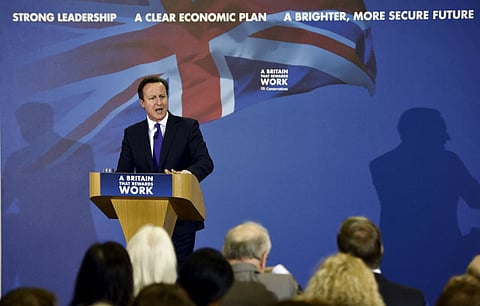Tories pay a high price for low reputation
Increasingly, even in London, supporting them is a transgressive act

In politics, the word “brand” itself has a bad brand. At best, it sounds shallow. At worst, it evokes a marketing spiv. Swap the B-word for “reputation” and suddenly it is easier to talk about this decisive electoral variable. For nobody doubts that a party’s reputation — its image and perceived values, the gut reaction created by a mention of its name — goes a long way to determining its prospects.
If the Conservatives lose the general election in Britain next month, they can only blame their own reputation. The spheres have aligned for the incumbents. The economy is the strongest in Europe. British Prime Minister David Cameron is preferred to Ed Miliband, the Labour leader, as prime minister. The right-tilting press is doing its potent work. Party donors have chipped in generously. It would be no surprise if even the weather is nicer in Tory than in Labour wards on May 7.
And still the party cannot escape the noxious reputation that began to form in the 1980s, calcified in the 1990s, softened promisingly under Cameron in the last decade, and hardened again in this one. Too many Britons, including some eye-wateringly Right-wing ones, refuse to vote Conservative as a matter of identity. In Scotland, northern urban England and increasingly even London, that buccaneering free-market, the party is ‘Other’. Supporting it is a transgressive act, like being a punk or emo.
In polls, in focus groups, on doorsteps, the Tory party encounters people who are quietly admiring of its work in government and still cannot bring themselves to mark a ballot in its favour. As long as there are conservatives who are not Conservative, the party will fall short of its electoral potential.
Next to this old, fathomlessly deep problem, worrying about the Tory election campaign is otiose and small-bore, like quibbling with the stride pattern of a sprinter who is running hamstrung. Westminster dwells too much on the particular and not the general; the temporal and not the structural. It also has no memory. Critics who panned the party’s 2010 campaign for putting airy ideals over market-tested messages deride this one for its lack of ideals and reliance on market-tested messages.
Even if both criticisms were correct, neither matters because campaigns do not count except at the most local level. Voters are not blank atoms who are acted upon and done to, at least not by a five-week national campaign. They have instincts and prejudices that form glacially. Over decades the Tories have failed to understand this process, much less influence it, and so they find themselves on the wrong side of it. They have acquired infamy in a country they used to dominate because they have not tended to the shallow things that really matter: Image and reputation. They are viewed as the party of the rich and the harsh. Whether this reputation is warranted is an important moral question and an immaterial political one. A reputation is what it is, and the burden is on the bearer to fix it.
Cynics tease Cameron for spending the best years of his life managing the media relations of a television company, a job that seems to pile artifice on artifice. But his problem is not that he is obsessed with public relations. His problem is that he is not obsessed with public relations. He thinks a record of achievement is enough. It is not, even in business. Skoda still had a comical image long after it had started to manufacture impressive cars.
Changing a reputation requires skill and persistence. Cameron has the first of these. In his early years as Tory leader, he showed intuitive mastery of political image. He knew that an eye-catching gesture could do more to shake perceptions of his party than a thousand policy reviews. He knew that a policy can be popular on its own terms and still repel voters by confirming their suspicions about the party proposing it. So he went easy on tax cuts and migrant-bashing. Tories still cringe at the shallowness of early Cameron, but he should refer them to the polling archives: The party hit 50 per cent in 2008.
Then came the crash and the fiscal crisis. Softening an image is tricky when there are brutal decisions to make. But there was no need to give up. Tories now sometimes resemble classical economists confronted by real humans: They are thrown when voters act on the basis of gut and tribe rather than cold calculation of available information.
William Shakespeare, who died 399 years ago this week, wrote of reputation as the ultimate form of wealth: The “purest treasure”, the “immediate jewel”. Tories think voters are only moved by treasure itself: Jobs created, incomes boosted, largesse dispensed. These jewels are not enough if the party neglects its own good name. That neglect goes back decades, not the past three weeks.
— Financial Times



